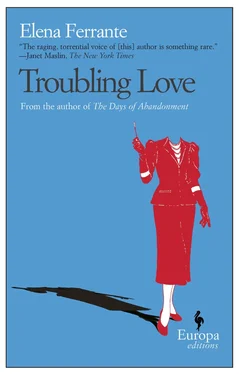Finally I said to Polledro, surprising him by the sociable tone that he didn’t expect, after so much silent resistance:
“I remember very well. You’re Antonio. How in the world did I not recognize you right away? You have the same eyes as before.”
I smiled to show that I wasn’t hostile but also to find out if he felt hostile toward me. He stared at me in bewilderment. I saw him ready to lean over and kiss me on the cheeks but then he decided not to, as if something about me repelled him.
“What’s the matter?” I asked the man from the Vossi sisters’, who, now that the tension of approaching me had vanished, looked at me with a kind of irony. “Don’t you like my dress anymore?”
After a moment of uncertainty Polledro decided. He smiled and said to me:
“You’re a bit of a mess. Have you seen yourself? Come, you can’t go around like that.”
He pushed me toward the exit and then, quickly, toward the taxi stand. People who had been surprised by the rain were crowding under the roof of the subway entrance. The sky was black and the wind was blowing hard, driving on a diagonal a curtain of fine dense drops. Polledro got me into a taxi reeking of smoke. He spoke with speed and assurance, without leaving me space, as if he were convinced that I must feel great interest in what he was saying. But I was hardly listening; I couldn’t concentrate. I had the impression that he lacked a precise plan, that he was talking with a frantic display of self-possession that served only to contain his anxiety. I didn’t want it to infect me.
With a certain solemnity he begged my pardon in the name of his father. He said he didn’t know what to do: old age had utterly ruined his brain. But he assured me immediately that the old man wasn’t dangerous, and that he wasn’t bad. He was uncontrollable, yes: he had a strong, healthy body, he was always out and about, it was impossible to restrain him. When he managed to steal enough money from him, he disappeared for months. Abruptly he began to list for me the cashiers he had had to let go because they had been corrupted or taken in by his father.
While Polledro spoke, I noticed his smell: not his true smell, which was overpowered by the stench of sweat and tobacco that pervaded the taxi, but an odor invented by starting from that of the shop selling sweets and spices where we had often played together. The shop belonged to his grandfather and was a few blocks from where my parents lived. The sign was of wood, painted blue, and next to the legend “Coloniali” there was a palm tree and a black woman with very red lips. That sign my father had painted at the age of twenty. He had also painted the counter in the shop. He had used a color called burnt sienna to make a desert, and in the desert he had put a lot of palm trees, two camels, a man in a bush jacket and boots, cascades of coffee, African dancers, an ultramarine-blue sky, and a quarter moon. It was easy to reach that landscape. Children lived out on the street, without supervision: I would leave the courtyard of our building, turn the corner, and push open the wooden door, which had a window in the upper half and a diagonal metal bar across it. Immediately a bell rang. Then I went in and the door closed behind me. The edge was padded with fabric, or perhaps covered with rubber, to keep it from slamming. The air smelled of cinnamon and cream. On the threshold were two sacks with rolled-down edges, full of coffee beans. Above, on the marble counter, containers of cut glass, with designs in relief, displayed white, blue, and red sugared almonds, caramels, multicolored candies that melted in your mouth, releasing onto your tongue a sweet liquid, black licorice in sticks, in coiled or loose laces, in the shape of fish or boats. While the taxi battled the wind, the rain, the flooded streets, the traffic, I couldn’t reconcile disgust for Caserta’s red tongue, for the scary games played with the child Antonio, for the violence and blood that derived from them, with the faint odor that Polledro preserved in his breath.
Now he was trying to excuse his father. Sometimes — he was saying to me — he bothered people a little, but you just had to have patience: without patience, living in that city was difficult. Especially since the old man didn’t do any great harm. The greater harm was not what he did to his neighbor; it was the damage he did at the shop when he bothered the clients. Then it made him see red, and if the old man had fallen into his hands it would have been easy to forget that he was his father. He asked if he had bothered me. Was it possible that he himself hadn’t realized I was Amalia’s daughter? It had taken him a few moments, the time to collect his thoughts: I couldn’t know what a pleasure it was to see me again. He had run after me but I had already disappeared. He had seen his father, instead, and this had enraged him. No, I couldn’t understand. He was risking present and future with the Vossi shop. Would I believe him if he told me that he didn’t have a moment’s respite? But his father didn’t realize the economic and emotional investment he had made in that enterprise. No, he didn’t realize it. He tormented him with continuous requests for money, threatened him night and day on the telephone, and annoyed the clients on purpose. On the other hand I shouldn’t think that he was always the way I had seen him in the funicular. If necessary the old man knew how to behave, a real gentleman, so that women listened to him. Then, when he changed his tune, there was trouble. He was losing money because of his father, but what could he do? Murder him?
I said to him dully: yes, of course, no, really. I was uneasy. My dress was soaked. I had glimpsed myself in the rearview mirror of the taxi and realized that the rain had dissolved the mask of makeup. My skin was like a grainy and faded fabric, striped by blue-black rivulets of mascara. I was cold. I would have preferred to return to my uncle’s house, find out what had happened to him, reassure myself, take a hot bath, lie down. But that massive body beside me, bursting with food, with drink, with worries and resentment, who carried deep within himself a child smelling of cloves, of millefiori liqueur, and of nutmeg, with whom I had played secretly as a child, interested me more than the words he was saying. I assumed that he couldn’t tell me things that I hadn’t already told myself. I didn’t count on that. But to see those enormous hands, broad and thick, and recall those of Antonio the child, and to feel that they were the same even though they displayed no sign of that time, kept me even from asking where we were going. Beside him I felt miniaturized, with a look and a size that I hadn’t had for years. I skirted the painted desert of the counter of the bar - coloniali , I pushed aside a black curtain and entered another place, where Polledro’s words couldn’t penetrate. Here was his grandfather, Caserta’s father, who was the color of bronze, bald, his skull dark, eyes whose whites were red, a long face, an almost toothless mouth. Various mysterious machines were ranged around him. One, which was sky-blue, and elongated, with a shiny bar across it, was used for making gelati . Another consisted of a bowl with a rotating mechanical arm, in which he whipped yellow cream. In the back there was an electric oven with three compartments, the peepholes dark when it was turned off, the handles black. And behind a marble counter Antonio’s grandfather, grim and wordless, skillfully squeezed a cloth funnel from whose serrated mouth cream emerged. The cream extended over pastries and cakes in a beautiful wavy line. He ignored me as he worked. I felt pleasantly invisible. I stuck a finger in the bowl of cream, I ate a pastry, I took a candied fruit, stole some silver sugared almonds. He didn’t bat an eyelid. Until Antonio appeared and gestured to me and opened, behind his grandfather, the door to the cellar. From there, from that place of spiders and mold, emerged, a hundred times in a row and in a few seconds, Caserta in a camelhair coat and Amalia in her dark suit, sometimes with hat and veil, sometimes without. I saw them and tried to close my eyes.
Читать дальше












